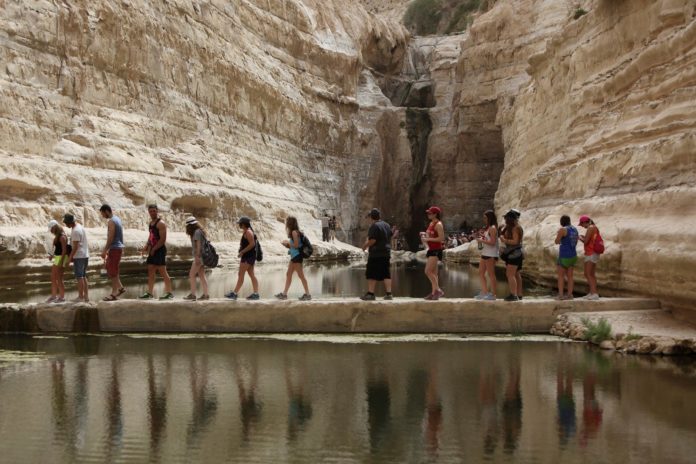Good morning…..Boker tov.
Additionally, What is the proper response to Shalom? One such word is shalom, which, in everyday usage, can mean either “hello” or “goodbye.” The traditional greeting among Jews is shalom aleichem, peace unto you; to which the response is aleichem shalom, to you, peace.
How do you respond to Ma nishma? Terms in this set (6)
- Not good. Lo Tov.
- not bad. Kacha kacha.
- Good. Tov.
- Very good. Tov ma-od.
- Excellent. Mezzuyan.
- Great!!
Subsequently, What is Happy Birthday in Hebrew? In Hebrew, “happy birthday” is “yom huledet sameach.” It can mean a great deal to wish or sing somebody a yon huledet sameach at an event, such as a Bar Mitzvah.
FAQ
What does Neshama Sheli mean?
Neshama sheli – ‘my soul‘ – has become a popular term of endearment among Israelis.
How do you say bye in Israel?
How do you say thank you in Israel? Say « toh. » In Hebrew, the simplest, most common way to say « thank you » is « toda » (תודה). The first syllable is very similar to the English word « TOffee. »
How do Muslims greet each other? To greet in Islam, say « As-Salam-u-Alaikum, » which means « Peace be unto you. » If someone returns the greeting, say « wa-Alaikumussalam wa-Rahmatullah, » which means « May the peace, mercy, and blessings of Allah be upon you. » To learn how to shake hands with Muslims when you’re greeting them, scroll down!
What does Toda mean in Hebrew?
Toda. [slowly] Toda. It means “thank you.” If you want to show your sincere appreciation for something, say this phrase. Toda raba.
How do you say good evening in Israel? “Good evening”- Erev tov!, is used for the evening and night upon greeting and when you leave you’ll say “Good night” – Layla tov!.
How do you greet an Israelite?
The most common greeting and parting phrase in Hebrew is “Shalom” (Peace). Jewish Israelis may also greet by saying “Ahlan”. “Shalom’ may be followed by the casual greetings of “Ma nishma” (What’s up?) or “Ma koreh” (What’s happening?).
Can you say Mazel Tov birthday? 2) Mazel Tov
Tov is luck. However, it’s more so used as congratulations. Yes, you can use them for Hebrew Birthday wishes.
What does Chag Sameach mean in Hebrew?
You can also say “chag sameach,” which translates to “happy festival” and is the Hebrew equivalent of “happy holidays.” To make this Passover greeting specific, you can throw the word “Pesach” in the middle of that phrase — “chag Pesach samech.” To wish somebody a “kosher and joyous Passover” in Hebrew, it would be “ …
What is the Hebrew name for Sun?
52) Samson (Hebrew Origin), meaning « sun ». This name can also be spelt Sampson.
What does Booba mean in Hebrew? ‘ Buba is a Hebrew word for »little doll » and may have been the source of an affectionate term for a small grandmother; however, the similar baba is also used for »grandma » in Russian and other Slavic languages, which makes the origin uncertain.
What does Zay Gezunt mean? זײַ געזונט zay gezunt ‘be healthy; goodbye‘ (to multiple addressees, or more formally: זײַט געזונט zayt gezunt)
How do you say hi in Jerusalem?
This is exactly the way we could describe the most well-known Hebrew word for hello: שלום (shalom). Most of us know that this word means “peace.” However, it’s also the most classic of Hebrew greetings. It’s neither formal nor informal, and you can use it both to say hello and goodbye in Hebrew, to anyone!
How do you say hi in Israeli?
How do you respond to Toda Raba?
It’s literal meaning is “It’s nothing” and it is a common and polite way to respond to someone thanking you. So when someone is saying toda or toda raba to you, we can simply reply with: Bevakasha or Ein be-ad ma.
What does todah Rabah mean? Interjection. todah rabah. (in Jewish cultures) Thank you; many thanks.
How do you say bye in Arabic?
What is etiquette in Islam? Islam has rules of etiquette and an ethical code involving every aspect of life. Muslims refer to Adab as good manners, courtesy, respect, and appropriateness, covering acts such as entering or exiting a washroom, posture when sitting, and cleansing oneself.
Who should say Salam first?
In the time of the Prophet the Sahabah (companions of the Prophet ) would compete with each other, to see who could give salaams first. The Prophet (SallAllahu Alayhi Wa Sallam) said: “The best of the two persons is the one who begins with salaam.”
Don’t forget to share this post !























